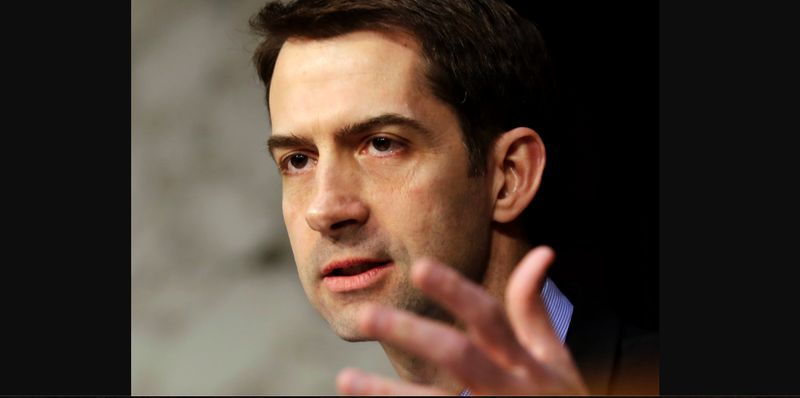WASHINGTON -- Arguing that the coronavirus pandemic is just beginning, Sen. Tom Cotton, R-Ark., on Wednesday urged Americans to prepare for a battle that could stretch the nation's health care system to the breaking point.
While President Donald Trump has spoken of reopening the country by Easter, Cotton cautioned against adopting an arbitrary timeline.
In a speech on the Senate floor, Cotton said a rapid return to normalcy is unlikely. He urged Americans to use the days and weeks ahead to prepare for the looming onslaught.
The virus, first detected in China, has already "arrived in force" in New York, Seattle and elsewhere, the Dardanelle lawmaker noted.
[CORONAVIRUS: Click here for our complete coverage » arkansasonline.com/coronavirus]
"In emergency rooms and ICUs, courageous doctors and nurses are already locked in a battle to save the lives of their patients. Protective gear is in short supply, but their regard for safety and even family comes second to their duty. The days ahead will be a close-run thing in those cities, as they struggle to keep their hospitals open and functioning. But make no mistake: The China virus will spare none of us, from the high-rises of the big cities to the hills of the Ozarks," he said.
"The darkest days of this crisis are in all likelihood ahead of us," he said.
[Video not loading above? Click here to watch: youtube.com/watch?v=urKyLe81aLI]
Skeptics argue that the restrictions should be relaxed soon, warning that the economic harm is too great.
The president has acknowledged these concerns in recent days, as he weighs how to proceed.
"We cannot let the cure be worse than the problem itself. At the end of the 15 day period, we will make a decision as to which way we want to go!" Trump tweeted Sunday in all-capital letters.
Tuesday, the president suggested a reopening could be on the horizon.
"I would love to have the country opened up and just raring to go by Easter," he told a Fox News town hall.
That's a sentiment shared by many in the business community.
"Probably optimistic but a great goal. [It] would be a wonderful development," Randy Zook, Arkansas Chamber of Commerce president and chief executive, said in an electronic message.
But easing restrictions prematurely, Cotton warned Wednesday, would have catastrophic consequences.
"If we give up on our efforts to control this virus now, our medical system will be overwhelmed. Hospitals will collapse. Care will be rationed. Doctors will face the terrible choice of whom to save and whom to let perish. And not just for patients with this virus -- for every other American who needs intensive care, whether from a heart attack, or a stroke, or a car wreck, or anything else," he said.
Such a move would increase suffering without fixing the nation's economic woes, Cotton said.
"If left unchecked, this deadly virus will continue to wreck our economy as surely as it already has," he said.
While an "immediate reopening" isn't an option, neither is it possible for the restrictions to continue forever, Cotton noted.
"The American people can only hold out for so long. So, we must come up with a better plan, and fast," he said. "That plan starts with this big pause, as we protect ourselves and each other. We simply don't have the resources today to fight any other way. But it won't end with this approach. We must use the precious days and weeks ahead to lay the groundwork for a new strategy to fight the virus, a strategy that will allow all of us to gradually get back to work."
Testing abilities must be ramped up quickly, billions of masks must be acquired; those infected must be identified and quarantines for those exposed to the virus must be strictly enforced, he said.
The restrictions will be temporary but shouldn't be lifted rashly, he suggested.
"America must indeed reopen. When we do, these decisions must be based on local conditions, not an arbitrary, nationwide timeline," he said. "Our governors and mayors understand their local conditions. They can make gradual, rolling, calibrated decisions in a way that is responsible--when the tools to effectively fight this virus are ready and available."
Sen. Ron Johnson, R-Wis., last week emphasized that most Americans will survive the coronavirus pandemic, telling the Milwaukee Journal Sentinel, "We don't shut down our economy because tens of thousands of people die on the highways. It's a risk we accept so we can move about. We don't shut down our economies because tens of thousands of people die from the common flu."
Monday, Trump made a similar point, noting the high number of flu-related deaths -- an estimated 23,000 this season -- and road-related fatalities -- roughly 36,000 a year.
As of Wednesday evening, the total reported death toll in the U.S. for coronavirus was 1,031, according to the Johns Hopkins University & Medicine Coronavirus Resource Center.
"You look at automobile accidents, which are far greater than any numbers we're talking about," Trump told reporters. "That doesn't mean we're going to tell everybody, 'No more driving of cars.' So we have to do things to get our country open."
Wednesday, Cotton suggested the comparisons may not be apt.
"Some thoughtful observers note that the seasonal flu and automobile accidents kill more Americans annually than has this virus. That's true, as far as it goes," he said. "But we're just at the beginning of this pandemic. And, I have to add, the Javits Center in New York City has never been converted into a field hospital for the flu and car wrecks."
A Section on 03/26/2020

